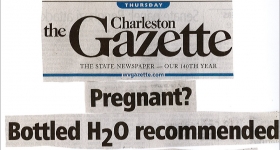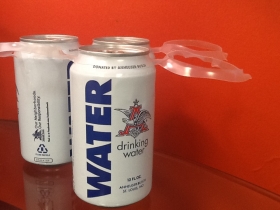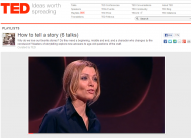You are here
Is Philanthropy Missing A Golden Opportunity in West Virginia?

This post was authored by Vanessa Daniel, Executive Director of the Groundswell Fund.
This month the National Science Foundation called the Freedom Industries' spill in West Virginia "one of the largest human-made environmental disasters in this century." The January 9th chemical leak, which led to a state-imposed ban on water usage for more than 300,000 West Virginians, has sparked public outrage that is now at a boiling point. All over Charleston people are talking to each other about the water. Community meetings are popping up across the spill zone. Everyday people – most of whom have never identified as environmentalists - are angry and ready to take action.
Image source: Steve Helber/APIt is a coal-backing politician’s nightmare and an environmental organizer’s dream. A chance to bring thousands of people into a movement for environmental justice, to channel a groundswell of public outrage into an organized grassroots base with the power to advance progressive policy change in the heart of coal country. But this unique window of opportunity will not be open forever.
This fact has not been lost on conservatives who have moved swiftly to preempt progressive base building. The deregulation group Americans for Prosperity appeared on the scene shortly after the spill, distributing bottled water and collecting contact information from residents for its outreach list. It has not been lost on progressive organizations like the Ohio Valley Environmental Coalition (OVEC) and West Virginia FREE (WV FREE). Both organizations are longstanding grassroots organizing groups with a membership base in the spill zone. These dynamic organizations recognize the threat and opportunity for environmental and reproductive justice and have swung into action.
Image source: Margaret Chapman PomponioThe question is, has it been lost on philanthropy? A month after the spill, grassroots organizing shops in the spill zone have clear action plans, policy goals and urgent calls issued for funding that would enable them to mobilize residents now, while the legislature is in session and debating several progressive environmental bills. Yet precious few resources have moved from foundations to support these efforts.
Philanthropy is not known for its speed and nimbleness or for its commitment to moving significant resources at the state and local level. West Virginia and Appalachia in general are the focus of comparatively little philanthropy. Philanthropy also is not known for its ability to break out of issue silos when the moment demands it. All of these are proving to be impediments in West Virginia. Longstanding environmental justice organizing groups like OVEC are still waiting for funds to come in at more than a trickle, as are key allies that OVEC has asked to team with them in organizing efforts.
One of Groundswell Fund’s grantees provides a great example of how short-sighted issue silos can be. WV FREE is a longstanding powerhouse for reproductive justice with a base of over 5,000 women in the spill zone. Why are they are in this fight? The Center for Disease Control’s advisory to pregnant women to not drink the water (issued days after the state declared the water safe) has made this a clear reproductive health issue. With a proven record of mobilizing hundreds of people to take action, and securing scores of policy victories against great odds, WV FREE is well positioned to put their shoulder to the wheel alongside OVEC and organize women in the spill zone.
Why is philanthropy not responding more readily to this situation? Historically low investment in Appalachia may be part of it. Another issue may be philanthropy’s own silos. Environmental health funders may not have a group like WV FREE in their sights because it isn’t branded as an environmental organization. Yet WV Free has grassroots power to bring to this fight which could create the tipping point needed to win progressive environmental policy and they may become a strong new player in the environmental movement for the long haul.
Reproductive rights funders may worry that this fight is a distraction from the issues of abortion and contraception access that they have funded WV FREE to advance. This too would miss the fact that many of the thousands of women WV FREE will bring into its base around a water issue also care about abortion rights and will strengthen their muscle to fight on all fronts.
Philanthropy is siloed and geographically fragmented. People’s lives are not. Everyday people are affected by and willing to engage on a range of issues. Water flows downstream across state lines. And a lot of national politics flow up from the grassroots.
The best grassroots organizing groups work in a multi-issue way to be relevant and responsive to community priorities and to create many points of entry for people to join their base. If we believe grassroots power is critical to win policy and systems change, then foundations must give organizations the room to work on multiple issues. If we acknowledge that no one organization can win in isolation but that a healthy progressive ecosystem is needed to win at scale, then we must also step up to support cross-issue work and alliances.
One way funders can transgress issue silos at the state level is to provide support, not only to a primary grantee, whose mission is dedicated to the foundation’s top issue priorities, but to key ally groups that surround that grantee; allies that deliver the collective power, solidarity and movement ecosystem necessary to win. In this model, funders acknowledge that no one group can win major change alone and they put a premium on groups that work in a cross-issue way that builds cross-movement alliances.
Another approach funders can take is to coordinate closely with each other to fund different pieces of a larger puzzle. In the case of West Virginia, the big picture puzzle might be boosting grassroots power building in the spill zone with different funders supporting the different pieces that are needed to achieve this. This allows funders to stay within their silos if needed, but coordinate to ensure that together they have funded the entire puzzle.
My hope is that grassroots organizing efforts around the West Virginia spill will receive the resources they need to step into this remarkable organizing opportunity before it is too late. I would also welcome conversation with funder colleagues across our silos about how to help advance these critical base building efforts.
Vanessa Daniel is Executive Director of the Groundswell Fund. Groundswell supports a stronger, more effective U.S. movement for reproductive justice by mobilizing new funding and capacity building resources to grassroots organizing and policy change efforts led by low income women, women of color and transgender people. Daniel serves on HEFN’s national Steering Committee as well as on the Steering Committee of the Bay Area Justice Funders Network.
From our Blog
Upcoming Events
|
Apr 23 2024 Zoom |
Apr 30 2024 Zoom |



